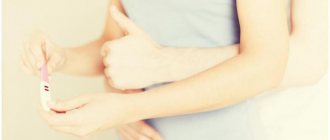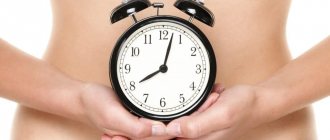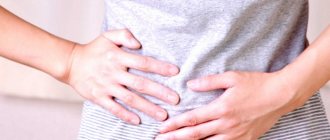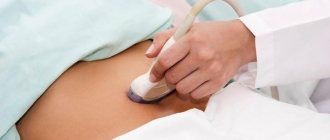Should you go to the doctor when you want sex before your period?
A woman’s appearance, mood, desires and well-being all depend on the production of certain hormones.
At certain stages of life cycles, the ratios between these substances in a healthy woman should be different. It is thanks to these changes that girls sometimes really want to dance, eat a lot, cry, or suddenly want to have sex. The main hormones that control a woman’s life include:
- estrogen;
- testosterone;
- oxytocin;
- thyroxine;
- norepinephrine;
- insulin;
- somatotropin.
Estrogen is the most feminine hormone; it is what makes a woman’s figure smooth and attractive, and her character soft.
Testosterone awakens sexuality and perseverance in a woman, and activates her libido.
Oxytocin provokes vulnerability, gentleness, caring and affection of a woman to her loved ones.
Thyroxine regulates metabolism and affects intelligence. It is women with average levels of this hormone who have a sharp mind and an elegant figure.
Norepinephrine makes a woman courageous, fierce and purposeful, motivates her to action and activates her brain.
Insulin is a hormone that allows you to get the energy you need for life from food.
Somatotropin allows a woman to be strong and slim; it regulates the growth of muscle mass and the elasticity of ligaments, including the ligaments that support the breasts.
All these hormones allow a woman to function productively and remain attractive in the eyes of men.
Thanks to the biological rhythms of the female body, testosterone and oxytocin are at high levels during menstruation. Reacting to all these changes, a woman’s libido increases, and she herself becomes very vulnerable and sensitive.
Testosterone levels remain high twice during the monthly cycle: during menstruation and during ovulation. These are the periods when a woman most wants sex. This is all no coincidence, because it is during ovulation that you have the highest chance of getting pregnant, and during menstruation, pleasant sensations will help relieve nervous tension and lift your spirits.
The level of these hormones in girls rises some time before the onset of menstruation, which is why they want sex before their period. This happens several days, or even a week before the onset of critical days. Instincts are designed in such a way that at this time a woman emits a smell that attracts men, so they usually do not object to such active behavior on the part of their fair half.
When it comes to having sex during your period, couples make their own decisions: some like to do it because the likelihood of getting pregnant is low, and some abstain from sex because they believe there is a certain risk of developing diseases. In part, both are right.
In order for menstruation and the remaining days of their absence to proceed normally, so that a woman can easily become pregnant, the organs of the reproductive system control hormones. In addition to organizing the necessary monthly functions and processes, they also keep pace and greatly influence the emotional background of a woman. Bursts of energy, eccentricity, sudden mood swings, tranquility, emotional storms - all this is caused by female hormones. In which phase which hormone is active and takes precedence over all, let’s look at it in more detail.
The menstrual cycle can be divided into 3 phases:
- Follicular phase
- Ovulatory phase
- Luteal phase
Lack of self-confidence and living under constant stress are two of the main reasons for low sex drive in women. After marriage and the birth of a child, many women lose their former attractive shape, and if, in addition, you inadvertently told her that she should lose weight to look more sexy, a feeling of guilt will also add to her insecurity. Take the time to remind her that she is a sexy woman and still excites you. Help her feel more confident.
Did you know that women who engage in physical activity for at least 30 minutes a day have a higher sex drive than women who are inactive? If your friend doesn't move much, suggest going for walks together in the evenings or join the gym together. Both of you will not only feel better, but you will also find a second wind in sex.
In general, a woman’s menstrual cycle is a very complex process that is regulated by sex hormones, and the state of natural hormonal levels is different for each woman. It is also worth saying that hormonal changes occur throughout the entire menstrual cycle, due to which one phase replaces another.
The cycle begins on the first day of menstruation, then the woman’s egg matures and ovulation occurs. The ruptured follicle is replaced by the corpus luteum, which produces hormones necessary to maintain pregnancy.
If conception does not occur, the corpus luteum regresses, and the next menstrual cycle ends with the beginning of a new menstruation.
Hormonal changes in the female body also occur before menstruation, so many women, shortly before it begins, begin to feel changes in their body, but the changes are different for everyone. Some women experience an increase in appetite and want sex, while others have a hard time with premenstrual syndrome, their libido decreases, irritability appears, and they feel unwell.
If you want sex more before your period than during other periods, then you can change the situation:
- having intimate intimacy every day so that the body produces the appropriate hormones;
- taking hormonal medications;
- trying to hold back.
The first method is good for married women whose husbands are at home every night and are ready to fulfill marital duties. And if the spouse works a day or three? Then you can resort to tricks like phone sex, but with your own beloved. Women are creatures with wild imagination, and this should definitely help them.
When the body produces hormones: endorphin, serotonin, in addition to raw attraction to a partner, a woman feels inspired and happy. With this combination, she will be ready to move mountains, and her creative activity may increase.
It is the fantasy world that will help you overcome this essentially animal feeling when it is impossible to have sex physically. All that remains is to ask: what to do with non-creative work, when you need to think and focus on the subject of research? Should I really take hormonal medications? People are often afraid to consume them because of the risk of gaining excess weight, and for good reason.
But there are also hormones from which a person can, on the contrary, lose terribly weight. Body volumes and shapes are important parameters, but not the main ones. You need to be wary of hormonal imbalance and lifelong dependence on drugs. Taking them thoughtlessly is not a good idea. This is a reason to consult a sex therapist, gynecologist, or endocrinologist.
Here every lady is free to decide for herself. If this desire can be resisted with varying degrees of success, then there is no reason for medical help. It is much worse when a woman experiences PMS “in all its glory,” causing migraines, pain in the abdomen and mammary glands, and severe swelling. During this period, you need to eat less table salt and eat foods that contain a lot of magnesium, potassium and calcium. If diets don't help, you can go to the doctor.
On the other hand, edema is unlikely to contribute to the appearance of sexual desire, but another “companion” of a woman appears during this period - itching in the vaginal area. This is what can once again provoke libido. But in reality, this is a reaction to a change in hormonal levels, and sometimes a weakening of the immune system, which can lead to a change in the composition of the microflora on the vaginal mucosa, which is why itching appears.
Weakened immunity allows microorganisms that were previously suppressed to multiply, and more abundant secretions create a nutrient medium for these microflora. If the itching is very severe, you still need to visit a gynecologist so that he can check with a smear whether thrush, also called candidiasis, has begun to develop.
And one more question remains: what to do if your libido does not let go, but your period has already begun? After all, fluid flowing through the vagina only aggravates desire, and from the point of view of doctors, sex is contraindicated on menstruation days.
Even doctors cannot give a clear verdict on this topic. Some argue that during sexual intercourse during menstruation, muscle spasms are relieved, and at the same time, blood vessels. Pain sensations decrease or disappear altogether. For a woman, this is manifested by a removal of the general tone and tightness in which the body can remain during this period.
The emotional component of sexual relations is also of great significance if the couple is in true harmony - not only the sexual act itself, but also the foreplay, accompanied by caresses. If you step away from purely emotional contact, then this process can be regarded as a relaxing massage, but its effect is great precisely because the “procedure is carried out” by a person dear to your heart.
The second group of doctors is inclined to see the risk of infection in sexual intercourse during menstrual periods, especially for both partners. After all, blood is a protein substance where bacteria can find a nutrient medium and multiply intensively.
This is why doctors are so afraid of infection of this organ due to the fact that a person could not endure a week and allowed sexual intercourse.
Signs of conception after ovulation by day (fertilization by day after ovulation).
Since the process of ovulation actually occurs at the cellular level, medicine claims that there are no objective symptoms of this condition, but there is a large list of subjective signs that can tell an attentive woman that the ovulation period is approaching.
Of course, a lot here depends on individual sensitivity, on the type of organization of the nervous system, but there are also more general signs that are characteristic of most women and girls of reproductive age. Usually the set of signs and manifestations is quite individual, and it is enough to observe your body for several months to understand which signs are characteristic of you and which are not.
2-3 days before ovulation, under the influence of hormones (mostly estrogen), so-called sensations - “precursors” - may be noted, these include the following.
The cervix, or, more precisely, the cervical canal located inside it, in response to an increase in estrogen, begins to actively secrete fluid, the task of which is not only to protect the uterus from the penetration of pathogenic bacteria and viruses, but also to help sperm make its way from the vagina to the fallopian tube. The cervical secretion has an alkaline environment, which somewhat reduces the acidity of the vagina, and male reproductive cells have a better chance of survival and successful entry into the uterus, and from there into the tubes.
The discharge becomes abundant and its consistency changes. They become transparent, viscous, viscous. The mucus looks like raw chicken egg white and easily stretches several centimeters between your fingers. Such discharge occurs only in the period before ovulation and during the day after it. In the first half of the cycle, there is little discharge, the period is called “dry”, they are not viscous and not abundant; after ovulation, the discharge becomes white, opaque, and its quantity decreases under the influence of progesterone.
This method is part of the symptothermal method for determining fertility; it allows you to most accurately recognize the fertile period when unprotected sex can lead to pregnancy.
The temperature of the internal organs is called basal, and doctors have long noticed that during the period of ovulation, due to changes in hormonal levels, this temperature rises by about 0.3 - 0.7 degrees, more often by 0.5 degrees. It is impossible to feel a rise in basal temperature; you can pay attention to the rise only by systematically measuring BT and keeping a temperature chart.
The measurement is carried out in the morning, without getting out of bed, without changing body position after waking up, observing all the requirements for this process. For measurements, it is advisable to use more accurate mercury thermometers, inserting the thermometer 2–3 centimeters into the vagina or rectum for 5–7 minutes.
In the first half of the cycle, the temperature remains reduced; estrogen does not allow it to rise. But on the day of ovulation, its concentration reaches a peak and falls, the corpus luteum immediately begins to secrete progesterone, so on the day of ovulation there is a short-term drop and an immediate rise in BT, the temperature remains elevated throughout the entire second half of the cycle. If there is no pregnancy, BT decreases 2–3 days before the expected day of menstruation.
If a woman is familiar with the basics of the symptothermal method for recognizing fertility, then she can independently palpate the outer part of the cervix. Before ovulation, along with an increase in discharge, it becomes softer and rises higher. In fact, this does not manifest itself at all on the physical level.
Increased libido
This sign is a signal from the body that it is time to take care of procreation; for this, favorable conditions have been created inside the body. Many women note that a couple of days before ovulation they begin to experience increased sexual desire, and this sign, which is so easy to feel, can be called a real gift of nature to the fair sex.
Ovulation itself lasts no more than one hour. And some feel the process of oocyte release by the following signs:
- on the right or left in the area where the ovulating ovary is located, there is a slight pain;
- during the day after ovulation, slight pain in the abdomen and lower back may be observed;
- the breasts enlarge and become sensitive, since the mammary glands are very sensitive to changes in hormonal levels;
- muscles under the influence of estrogen before and during ovulation become more elastic, which is well noticed by women who play sports, dance, and yoga;
- mood swings and emotions, instability of mental reactions and behavior;
- sleep disturbance, insomnia;
- moderate headache.
The main sign of the end of ovulation is a change in the color and consistency of the discharge - from transparent it turns into white or whitish, the consistency ceases to be viscous and viscous.
It is extremely difficult to say exactly why the egg matures later than the middle of the cycle; this requires an examination. To determine whether late ovulation is really occurring, there are the following methods:
- Do a special test;
- Monitor basal temperature;
- Determination of the level of specific hormones produced during ovulation;
- Folliculometry performed using ultrasound.
Many representatives of the fair sex have learned to measure their basal temperature to determine what time will be the best to get pregnant. Signs of the process with late maturation of the egg will be displayed on the graph: at first the indicators will decrease, and when the egg leaves the follicle, they will rise sharply. However, the method of measuring basal temperature can only be considered effective if it is performed correctly.
The moment of egg release can be detected using a pharmacy test. But here it is also important to use it correctly, only in this case the results will be reliable.
Examination of the ovaries with an ultrasound diagnostic device makes it possible to accurately determine late ovulation. Sometimes the result can be obtained using a blood test.
To obtain accurate results, research, regardless of the chosen method, must be carried out several cycles in a row.
During the examination, you may notice signs of late ovulation. As a rule, it is difficult to recognize the time of egg release, because the process is painless. But sometimes a woman notices the following symptoms:
- The mammary glands swell and become painful;
- The volume of discharge from the vagina increases;
- In the lower abdomen there is a nagging pain, tingling;
- Sudden mood changes, irritability even because of a trifle.
Often these are the signs that indicate the onset of ovulation. If a woman believes that ovulation is late, she should not independently resort to any methods to speed it up without consulting a doctor. It is very important to determine whether ovulation is really late and whether anything needs to be adjusted. Only a doctor can make the right decision based on the examination results.
Every pregnancy is unique. There are women who are able to feel pregnancy in the first week. By listening to her body, a woman understands that fertilization of the egg has occurred. It is unlikely that there is such a sensitive woman who can feel that very specific moment of fertilization.
However, there are signs and symptoms that may indicate that fertilization has occurred. Some women report experiencing early symptoms soon after their expected date of conception. If you feel something unusual and want to know if you are pregnant, the fastest way is to take a home pregnancy test, which in most cases gives reliable results.
In each individual case, symptoms will manifest themselves individually. The psychological factor is of great importance. If a woman does not plan a pregnancy, then she will not notice the changes occurring in the body. The main symptoms of pregnancy are:
- Emotional lability;
- Drowsiness;
- Increase in size and appearance of soreness of the mammary glands;
- Bloating;
- Fatigue;
- Change in libido;
- Disruption of the gastrointestinal tract.
Libido
Signs of conception after ovulation, as a rule, make themselves felt after 10-12 days. Among them are pain in the lower abdomen. They are triggered by the implantation process. As the embryo implants in the uterus, blood vessels may become damaged. In addition, muscle spasms occur.
Disruption of the digestive system occurs under the influence of hormonal changes. The onset of pregnancy is accompanied by an increase in progesterone levels. It provokes increased gas formation and diarrhea. Some women experience a change in taste preferences or loss of appetite after conception.
Changes in the mammary glands are one of the common symptoms of conception. Immediately after the implantation of the fertilized egg, a tingling sensation appears in the chest. Nipples become more sensitive. The volume of the mammary glands also changes. These symptoms are caused by an increase in the hormones hCG and progesterone.
Sudden cystitis
Some signs of conception after ovulation cause confusion in a woman, since they are only indirectly related to pregnancy. At the initial stages of an interesting situation, the microflora of the vagina changes. The number of pathogenic microorganisms may exceed the norm. If bacteria enter the urethra, symptoms of cystitis will occur.
Pain in the ovaries, uterus and lower back is most often felt during ovulation. Self-massage, rest and a relaxing bath will help reduce pain.
https://youtu.be/NyERjDH7gRw
Blame it all on hormones
Every month during menstruation, severe weakness is observed, accompanied by dizziness, nausea, pain in the abdominal area and irritability. In medicine, the combination of these clinical manifestations is called premenstrual syndrome. The degree of its severity varies.
During the normal course of menstruation, a woman does not experience severe discomfort, her condition only slightly worsens and all unpleasant sensations do not cause much discomfort. In situations where PMS symptoms are excessively pronounced, medical help is needed. Such changes indicate a pathological process.
Nature intended that the female body should prepare for conception every month. For this purpose, the hormone progesterone is produced in large quantities. If fertilization does not occur, then the level of the hormone decreases sharply, the process of producing prostaglandins begins, which is what causes the onset of menstruation. At this time, the endometrial vessels of the uterus narrow and their blood supply decreases.
Due to the processes occurring in the body, a woman may feel pain in the lower abdomen. During critical days, a woman loses 50-80 g of blood. For women who are anemic and have weak immune systems, blood loss can cause nausea and dizziness. The general condition of the body worsens, drowsiness appears, and in rare cases, loss of consciousness is observed due to hormonal imbalance. As the hormonal levels stabilize, the symptoms of menstruation disappear.
With menstruation, a woman loses blood and this can make her weaker.
Not every person can name all the hormones produced in the body by glands related to internal secretion. When women are about to menstruate, the ovaries work in a certain way, being responsible for the cycle, and other glands also take part in all this. Doctors have found that the category of paired glands, that is, the adrenal glands, is usually also responsible for the duration of the cycle.
The parathyroid glands are also included in physiology, along with the thyroid gland itself. Often, even the composition of the blood changes so much that it leads to an electrolyte imbalance, expressed in the occurrence of edema, headaches, cramps and an extremely aggressive mood. Often before your period you really want sex. This is how the well-known PMS begins, that is, premenstrual syndrome.
In everyday life, it is believed that its manifestation is accompanied by aggressiveness or tearfulness, but in reality it often turns out to be a severe malaise. Often this condition is caused by a strong excess of sodium ions in the blood. It is this electrolyte that displaces other ions, for example, the elements of magnesium, calcium and potassium, so not only your mood can change.
But why you really want sex before your period is still unclear.
The emotional component of intimate relationships also carries great significance. When a couple is in true harmony, then not just sexual contact itself, but also foreplay is usually accompanied by caresses. In that case, if you distance yourself from emotional interaction, then such a process can be regarded as a relaxing massage. Its effectiveness is great precisely because the procedure is performed by a person dear to the heart.
Another group of doctors sees sexual intercourse during menstruation as a serious risk of infection, for both partners at once. The fact is that blood is a protein substance where rapidly multiplying bacteria can find a nutrient medium. Today, the causes of endometrial inflammation have not been properly studied, and the treatment of this disease is very difficult.
In everyday life it is believed that its manifestation is either aggressiveness or tearfulness, but in reality it can also turn out to be severe malaise. More often it is caused by an excess of sodium ions in the blood. It is this electrolyte that displaces others - calcium, magnesium and potassium ions, so not only your mood can change.
The woman seems to change places with the man and becomes the initiator of sexual intercourse. At the same time, oxytocin levels increase. This hormone is responsible for the contraction of the muscles of the uterus, so its increase is natural during the period when the menstrual cycle ends. This hormone is a typical female hormone, because it is normally produced in large quantities after childbirth, helping to restore the size of the uterus and reduce bleeding.
Breastfeeding provokes the production of oxytocin, and sometimes during its strong release, the nursing mother feels almost unbearable pain in the abdomen. Similar pains can haunt not women in labor at all, but those women who begin menstruation. The uterus painfully twists and contracts, and during such periods a woman is unlikely to think about sex.
An unbearable desire for intimacy before menstruation is not the ugliest thing that raging hormones can provoke. When oxytocin does not increase as much as testosterone, there will be a strong desire for sex.
What prevents pregnancy
Of course, a girl may very much want to become a mother and may not have problems with the ovulation phase, however, this does not guarantee an early pregnancy. The fact is that only 50% of the success of an enterprise depends on women and the reasons for failure do not always lie in women’s health problems. Any specialist who is seriously involved in the problems of the reproductive process will easily point out the following probable factors for the fiasco:
- insufficient level of live and motile sperm in male semen;
- production of antibodies by the female body;
- hormonal imbalances in women;
- problems with the pelvic organs.
In the first case, the volume and quality of a man’s seminal fluid is affected by his age and the inflammatory and infectious diseases he has suffered. A similar problem can be identified by taking a spermogram. If we look again at the statistics, the causes of problems with conception in 40% of cases are the low activity of a man’s sperm. Based on the research data, the doctor determines the degree of likelihood of fertilization. When conception becomes impossible through natural means, artificial insemination methods come to the rescue.
However, women's health problems also have a significant impact on the possibility of conception. If a woman has a hormonal imbalance, then an anovulatory cycle is quite likely. In addition, a woman’s ability to become pregnant is often influenced by previous infectious and inflammatory diseases, as well as abortions.
Due to the above reasons, adhesions may form that interfere with the normal passage of the egg through the fallopian tubes. In addition, the presence of formations in the uterus (fibroids, polyps) can prevent the attachment of the embryo. As a rule, such formations are often indicated by pain during sex, as well as very characteristic discharge. Fortunately, adhesions are easily removed by laparoscopy. But treating fibroids, cysts or polyps can require a lot of time.
Pregnancy can also be prevented by the presence of antibodies in the cervical mucus. Normally, it helps the advancement of sperm, but in certain cases it becomes destructive for them. In such cases, doctors prescribe drugs that suppress the woman’s immunity, after which fertilization becomes possible.
Sex during your period: the benefits
Sex during menstruation has both physical and emotional benefits. Along with this, no doctor can give a categorical negative answer to the question about the possibility of having sex during this period of time.
Sex, first of all, is a way to show another person your love and desire, therefore, when making love with her man, a woman feels unity with him, his support and admiration.
Thus, the girl’s emotional state improves, irritability goes away, and her mood rises.
During menstruation, a woman’s vagina swells a little, its walls become more moisturized, so when sliding during intercourse, a woman, and a man too, feels more acutely and vividly, thus, a woman can get more pleasure than even making love in the middle of the cycle .
Having received pleasure, and especially if a woman has experienced an orgasm, she experiences uterine spasms and the pain that accompanies them, if such side effects accompany the woman during her menstrual period.
If during menstruation the desire is not strong, and especially if there is severe pain in the abdomen, then it is better to refuse to have sex during this period of time, as this leads to emotional shyness, insufficient relaxation and, as a result, even greater pain.
How to increase your chances of conceiving?
Doctors recommend that all couples planning a pregnancy practice sex during ovulation. But this does not always lead to the desired result the first time. According to statistics, only 30% of cases of unprotected sex result in pregnancy. There are factors that can affect the fertility of partners. To increase the chances of successful fertilization, you must resort to the following manipulations:
- The correct development and timing of egg release is confirmed using ultrasound folliculometry. The procedure will help identify a woman’s fertile period.
- Taking a spermogram will allow you to estimate how many days of abstinence a particular man needs before sexual intercourse.
- The position during sex is determined by the individual structure of the woman’s genital organs. For example, when the uterus is bent, a woman is recommended to be in a knee-elbow position.
- Vitamin supplements will help improve the quality of seminal fluid and stimulate ovulation in a woman.
- A man should avoid taking hot baths and visiting the sauna. High temperatures reduce sperm viability.
- In preparation for pregnancy, both partners should avoid drinking alcohol, caffeine and smoking.
- You should not practice sexual intercourse too often or too rarely. The optimal interval is 2-3 days. If there are deviations in the spermogram, it is determined individually.
- It is advisable to exclude stressful situations, since the psychological factor can have a depressing effect on reproduction.
Unprotected intercourse during ovulation
Unprotected intercourse on the day of ovulation does not provide 100% confidence that the egg will be fertilized. If a man has insufficiently motile sperm, the chance of pregnancy is reduced. The following factors are also important:
- Patency and contractility of the fallopian tubes;
- Endometrial thickness;
- Consistency and Ph-environment of vaginal secretion;
- Age of partners;
- Presence of infectious diseases.
If there was an unprotected period during ovulation, after 10-14 days an hCG test will help to understand whether conception has occurred.
Coitus interruptus
The question of whether it is possible to have interrupted sex during ovulation is most often of interest to young people. Not everyone knows that this method does not protect against pregnancy. It cannot be used as contraception. Active sperm are contained not only in the seminal fluid, but also in the lubricant that is released during sexual intercourse. If barrier protection is not used, sperm will enter the uterus before ejaculation. Therefore, as a result of interrupted sexual intercourse, conception can occur.
Read more Fence from the cervical canal
Why is ovulation a good thing?
Ovulation is the time when a woman’s body seems to say: “Take me.” On other days, purely physiologically, this need is not so pronounced. In short, you can guess when your partner's body is guaranteed to demand love. And remember during this period the female body is ready for pregnancy, so be careful, unless, of course, you want to become a father.
In order for the tertiary mature follicle to burst and release an egg, the body adjusts to the production of another hormone. Now the pituitary gland tries to secrete more luteinizing hormone so that the follicle bursts and the egg is released. This stage lasts up to 24 hours and is called the ovulatory phase.
During the period of ovulation, there is a sharp increase in basal temperature. The jump must be with a difference of at least 0.5 degrees. Subsequently, the basal temperature decreases. Now the luteinizing hormone runs the show and makes sure that the egg behaves normally and is always ready for fertilization, and helps the latter move through the tubes towards the sperm.
In place of the former follicle, the formed corpus luteum begins to produce progesterone. Along with this hormone, estrogen levels increase. Luteinizing hormone, progesterone and estrogens help and prepare the body for future pregnancy and childbearing. Changes also occur in the uterus under the influence of these hormones.
Nature also took care of the possibility and probability of conception. During the ovulatory phase, a woman’s production of androgens also changes. It is these hormones that affect a woman’s libido. Nature hints that the egg must be fertilized in order for the human race to continue. Therefore, it contributes to this in every possible way, even at the mental and chemical levels.
Androgens do not begin to be produced more than before. It’s just that in the luteinizing phase, for successful fertilization and future pregnancy, the body needs to reduce gestagens in the blood and their influence. Therefore, the ratio of gestagens and androgens is disrupted. At this time they prevail and begin to become active.
On this day, it is simply necessary to have sex with a partner, since ignoring desire can affect a future decrease in libido and manifestations of frigidity. If pregnancy is not desired, barrier contraceptives, hormonal contraceptives and other methods of contraception should be used. But don’t suppress your desire.
A little physiology
As you know, pregnancy occurs only when male and female cells merge. And if sperm can be “received” every day (although the process of their full maturation in the testicles lasts 64-74 days), then the egg is available only at a certain time - during the period of ovulation.
During this time, called the ovulatory phase of the menstrual cycle, the oocyte must:
- exit from the follicle that fed it into the abdominal cavity;
- to be caught in the villi of the fallopian tubes;
- through them enter the uterine cavity.
The egg lives for 6-7 days, during which it moves from the ovary to the cervix, but the viability of the cell, regulated by female hormones, remains for 24-36 (in rare cases 48) hours.
It turns out that during the first two days (in other words, immediately after ovulation) the risk of getting pregnant is maximum. Given this information, when should sexual intercourse take place?
The speed of sperm movement is 2-4 mm/minute. Full ejaculation increases their speed, so they can reach the uterus in 1-2 minutes, and then they will slow down. But fertilization should occur not in the uterus itself, but at the place where the fallopian tube passes into it. To get there, normal, full-fledged sperm need several hours.
Read more What period does menstruation take?
Luteinizing phase
During the follicular phase, follicle maturation begins. It must go through several metamorphoses in order for a full-fledged egg to emerge. It is present in the female body in its primary form. When the ovaries select it as the lucky egg that has been selected for future fertilization, the follicle begins to develop and grow.
After ovulation, the egg is capable of fertilization for up to 72 hours. In this phase, fertilization either occurs or the egg is left with nothing. These days, the levels of progesterone, estrogens and androgens remain as high. The body waits until the end for conception. If it does not happen, menstruation occurs.
We looked at what hormones influence a woman's desire. We also now know in what phase they are produced. Now let's look at changes in a woman's mood and her libido on certain days of the menstrual cycle.
A few important “whys” to understand
Physiology
Often, improper organization of sleep and rest, poor nutrition and a sedentary lifestyle can be good reasons for refusing sex. The combination of several, and often all of the above reasons, affects desire. The modern rhythm of life dictates its own strict conditions.
Psychology
A tired, constantly stressed woman is more focused on regulating the balance in her head than on sex. The inability or inability to fully rest seriously affects your appearance, look, real desires and feelings.
Grievances
A woman’s sex life and her perception of the world through emotions are closely related. If she is offended by her man, but the complaints are not expressed, and the issue is not settled, the desire to make love will decrease and eventually disappear completely.
Temperament
It happens that partners have completely different temperaments . A woman with low libido may well be satisfied with sex once a week, while a man most often will not be impressed by this arrangement. Moreover, at the beginning of a love relationship, wanting to impress, the woman showed great initiative.
Sometimes, in addition to natural reasons:
- fatigue background,
- stress,
- The problem may lie with the man himself.
To jump off the handle, break off a relationship, to make hasty conclusions about yourself or your loved one, to let destructive doubts into your head are delusions.
First of all, you should try to understand yourself and sensibly analyze the current situation. If necessary, seek the advice of specialists.
Itching in the vagina
On the other hand, edema is unlikely to contribute to the appearance of sexual desire, but another “companion” may occur during this period, namely itching in the vaginal area. It can provoke libido once again. Weakened immunity makes it possible for those microorganisms that were previously suppressed to multiply, and abundant secretions create a nutrient medium for these microflora. When the itching is very severe, you still need to visit a gynecologist so that he can check with a smear whether the patient has developed thrush.
And the following question remains: “What should you do when a woman’s libido won’t let go, and her monthly cycle has already begun?” After all, flowing fluid through the vagina only aggravates desire, and from a medical point of view, sex is contraindicated on critical days.
Why you want to have sex before your period is now clear.
After menstruation 7-11 days
These days are characterized by the end of menstruation and a sharp increase in the woman’s strength and energy. At this time, libido increases. The woman becomes calmer and more balanced. The girl’s physical capabilities also increase. Now she is becoming more sensual and susceptible to orgasms.
At this time, the likelihood of pregnancy is minimal, so it has nothing to do with this.
If it is not possible to abstain from intimacy during menstrual periods, then it is strongly recommended to follow simple rules:
- It is necessary to have sex with a condom. This will minimize the risk of contracting sexually transmitted diseases for both partners, but will not protect against the likelihood of endometriosis in a woman and the worsening of existing pathologies. Protection is also necessary to avoid unwanted pregnancy. According to gynecologists, conception can occur on any day of menstruation; its probability increases on the 5th day of the cycle and continues until the 16th.
- If the pain in the lower abdomen is very strong, it is better to refuse intimacy. When they occur during sex, sexual intercourse must be stopped.
- It is better to refrain from contact in the first 2 days, when the discharge is as abundant as possible.
- Many young people mistakenly believe that anal sex will help avoid the risks of contracting infectious diseases. In the rectum there are E. coli, which are likely to get into the vagina - there is a very small distance between it and the anus. In this case, the woman experiences an acute inflammatory process. Therefore, it is also better to refrain from this type of intimacy.
- Both partners must follow the rules of hygiene - take a shower and perform all necessary procedures before sexual intercourse. Women are not recommended to use toilet soap; it is better to give preference to gels for intimate hygiene. They have a composition more suitable for the physiology of the genital organs.
- To avoid staining your bed linen and clothes, you can have sex in the bathtub or shower. This will make this process as hygienic as possible and diversify the couple’s intimate life.
- In order to minimally impede the flow of secreted blood, it is recommended to perform sexual intercourse in those positions in which penetration is shallow, for example, missionary (man on top).
The woman has practically no discharge anymore, and if it appears, it is spotty in nature.
Some progressive research suggests that you can have sex during your period. This is justified by the increasing need of some women these days.
How to avoid pregnancy?
To prevent the development of pregnancy, it is necessary to avoid unprotected sex after ovulation, during it and a few days before it begins. It is necessary to use the most effective means of contraception during this period. These include:
- Intrauterine device;
- Condom;
- Oral contraceptives (Dosage form of contraception, in other words, a tablet).
ATTENTION! Before taking birth control pills, ALWAYS consult your doctor! An article about the consequences of taking postinor.
It is not recommended to practice interrupted coitus on the day of ovulation. It does not provide the required level of protection. The calendar method of birth control is suitable only for women with a regular menstrual cycle. Favorable days for conceiving a child fall exactly in the middle of the cycle. The rest of the time, the likelihood of conceiving a child decreases. The exception is situations in which ovulation is delayed by several days. This occurs due to hormonal imbalances or under the influence of stressful situations.
Among the common ways to determine the moment when ovulation occurs are the following:
- ovulation test. This option is the most accurate and expensive method of determining the time of ovulation. In every pharmacy you can buy such products and check 4 or 5 days in advance when ovulation occurs. If the cycle is regular, that is, 28 days, then measurements are taken three days before the expected maturation and release of the egg;
- calendar method. If we consider the middle of the cycle as the expected date of follicle release, then this method gives more accurate results. In this case, you need to keep a calendar and mark the beginning of the menstrual cycle every month or even every day. This method has been used for about six months, but the results are not always accurate;
- method of measuring basal temperature. It is carried out over 4 months and allows you to determine the first fertile day. However, before measuring body temperature in the rectum, you should not get out of bed and make sudden movements. Measurements are taken every day;
- individual feelings. Many women feel an increase in libido within two or three days - they want intimacy. A woman may observe abundant transparent vaginal discharge, similar to mucus, pulling in the lower abdomen. If you listen to your body, you can understand that in 1 or 2 days the period of ovulation will occur and pregnancy is possible.
Do not forget that fertilization can occur on the second day after ovulation, because this process lasts for two days. On the 3rd day after ovulation, the chances of getting pregnant are minimal if the cycle is regular. Therefore, plan to conceive a day before or immediately after ovulation, and not vice versa.
12-15 days
These days coincide with the preovulatory phase. A woman becomes more passionate due to the dissociation of hormones and the predominance of androgens over gestagens. During this period, a woman is especially stress-resistant and resilient. She can handle all problems. Memory improvement is observed. Sensitivity and excitability increase.
For a man, a girl becomes more attractive and a stronger chemical bond is established. Due to increased estrogen, the girl seems to emit a special smell that attracts males.
Main features
If you monitor your well-being, a girl will notice physical signs of fertile days. Changes occur in a woman’s body, and these processes have their own symptoms. Physiological signs indicate a favorable period for fertilization and pregnancy: changes in the level of hormones in the body, an increase in temperature in the anus. During this period, the chances of pregnancy increase.
There are 6 known signs that fertile days are approaching, which are noticeable without consulting a doctor:
- copious discharge. 3 days before ovulation, you can observe an increase in discharge from the woman’s genital tract: it acquires a viscous consistency and is secreted abundantly;
- bloating and pain. One day before ovulation, a woman feels aching pain in the lower abdomen and side, which is associated with the release of the egg from the follicle. Increased gas formation is often observed, which goes away after the end of the fertile period;
- blood discharge. Sometimes, in addition to clear mucus, scant bloody discharge is observed - this indicates that ovulation will occur in a few days;
- chest pain. If the mammary glands have become sensitive and painful, the cause is hormonal changes that are observed 1 day before the fertile period;
- increased libido. Many women have a desire for intimacy a couple of days before ovulation. This is explained by a natural feature, so that the period favorable for fertilization is not missed;
- altered taste sensations. Due to changes in the level of hormones in the blood, a short-term exacerbation of taste buds is observed.
Strong pain
It is somewhat worse when sexual intercourse is prevented by severe pain in the partner. With aching pain, a woman cannot get rid of spasms, and by entering into hasty contact, she provokes their intensification, so there is no point in acting rashly: it is best to listen to the body. As for sexual desire that occurs before menstruation, it should be noted that it is not a pathology. The choice of whether to satisfy it or refuse it remains solely with the woman.
We looked at why you want sex before your period.
Is increased libido normal or a sign of pregnancy?
The first signs of pregnancy cannot always be recognized quickly. Sometimes toxicosis or growth of the uterus does not occur in the initial stages.
Successful conception provokes the production of hormones such as progesterone (“pregnancy hormone”). Their increase affects the physical and emotional state of a woman.
It would seem that an increase in progesterone reduces desire, which means that increased libido cannot be a sign of pregnancy. But it's not that simple. Pregnancy is not always accompanied by a decrease in libido. Sometimes the attraction on the contrary becomes very strong.
Thus, a decrease in libido may be associated with general fatigue of the body, which appears due to the active production of progesterone. A pregnant woman may develop insomnia and increased fatigue.
Sometimes pregnant women experience hypersensitivity. In such cases, caresses and touches may cause discomfort.
In any case, a sharp change in libido (growth or decline) in most cases is the first sign of pregnancy.
During menstruation and before it you want sex: reasons
Frequent urination may indicate a “female cold” or diseases of the urinary organs.
Implantation discharge
When an egg implants into the wall of the uterus, slight bleeding is sometimes observed. This symptom is extremely rare.
It is worth remembering that intermenstrual bleeding may not be a symptom of pregnancy, but of gynecological problems.
Reliable signs of pregnancy before menstruation
The following signs are the most reliable: 1. High level of hCG - human chorionic gonadotropin (a level of 25-156 mU/ml is observed already in the first two weeks of pregnancy, while in non-pregnant women it usually does not exceed 5 mU/ml). If there is a need to detect pregnancy before the expected menstruation, it is recommended to do a laboratory blood test for hCG, since the level of this substance in the blood is 2 times higher than in the urine. Tests may give false negative results. 2. Increased basal temperature (when measured after an overnight rest, it exceeds 37°C).
As you can see, the first signs of pregnancy before menstruation are extremely difficult to recognize. If you have indirect symptoms and need to urgently determine your condition, contact the laboratory.
At the beginning of any relationship between two people there is something that begins to slip away over time - passion and desire. Family life is not only about spiritual and physical intimacy. This includes responsibility, raising children, caring for the elderly, distributing finances, and so on.
What was considered natural at the beginning of a relationship, for example, burning sex, sympathy for all the obvious and hidden shortcomings of each other, changes over time, to put it mildly.
When the period of euphoric love ends, the couple is faced with situations that test their true feelings. Unsatisfied partners seek outside relationships and get divorced.
For men, the topic of sex is very important in life. Everyone wants not only to have a wife, but also to see next to him the very personification of sensuality and passion, and constantly. But what if the beloved, once desired man has ceased to excite? Why don't you want to have sex with him? Or the end of the passion - and the end of the relationship?!
Change in blood circulation
Fluctuating hormones cause a woman's mood to change, and she may well want sex during her period. Increased blood flow in the area of the internal genital organs promotes rapid arousal and more vivid sensations from sexual intercourse. It is not uncommon for women to experience intense or multiple orgasms.
Increased libido can also be explained by the positive effect of sexual intercourse on a woman’s well-being. It helps her relax, relieves pain and discomfort. Psychological factors also have a significant impact on sexual desire.
In this situation, the principle of the sweetness of the forbidden fruit comes into play. It is human nature to want what is forbidden to him. If a woman experiences difficulties with sexual intercourse outside of menstruation, and sex does not bring her joy, a forced ban on intimate life helps the disappearance of fears and relaxation. And libido is paradoxically restored and even significantly enhanced.
Sometimes the desire for sex during menstruation is a kind of subconscious provocation of a man, a test of his feelings. After all, not all partners are ready to overcome disgust and experience pleasure from sexual intercourse during the period of bleeding. But if a man shows attraction, it means that his feelings for his partner are quite strong.
Of course, this logic of reasoning is incorrect, but it is precisely their irrationality that distinguishes subconscious motives from common sense.
What to do if libido increases during menstruation?
Before menstruation, poor health occurs due to changes in blood circulation in the vessels. On the eve of menstruation and during its process, a situation arises when the vessels dilate, then sharply narrow. Oxygen reaches the brain cells in minimal quantities. The so-called temporary oxygen starvation leads to dizziness, loss of consciousness, and headache.
- headache;
- nausea;
- weakness;
- dizziness;
- pallor;
- increased fatigue;
- cardiopalmus;
- cold sweat.
How to reduce the risks of sex during menstruation
- Sex during menstruation should also be with a condom. This way you reduce two risks at once: unwanted pregnancy and endometritis (of course an STD)
- Avoid maximum penetration of your partner into the vagina. This will reduce the risk of cervical injury
- Increase the time of foreplay during sex during menstruation: the duration and intensity of vaginal contact in this case will decrease, and you will get pleasure with less risk
- You should not douche after sex during menstruation: this can introduce bacteria from the vagina into the uterus
- Sex positions during menstruation are preferable when the uterus is located above the entrance to the vagina: not lying down or inverted
Why does discomfort occur?
Pain during sex during ovulation often manifests itself in a variety of forms. This is about:
- migraines,
- tingling in the heart,
- pain in the ovarian area,
- discomfort comparable to that which occurs with bleeding.
In order to be able to distinguish whether this or that condition is dangerous for a woman, it is necessary to know the symptoms that may occur during the release of the egg. In particular, pain often occurs due to the onset of small bleeding from the ovary. Although it subsequently stops, irritation appears on the walls of the abdominal cavity. If we talk about the degree of pain, they depend on the amount of bleeding.
The results of surveys of many women say that it can mainly be painful during PA during ovulation, when the positions chosen by the partners are deep, that is, maximum penetration is ensured. On the other hand, such positions increase the chances of conceiving a baby. Some also complain of discomfort in the ovaries. Doctors consider this to be normal.
Among the symptoms are the following:
- nipples hurt
- chest fills up
- stomach pulls.









